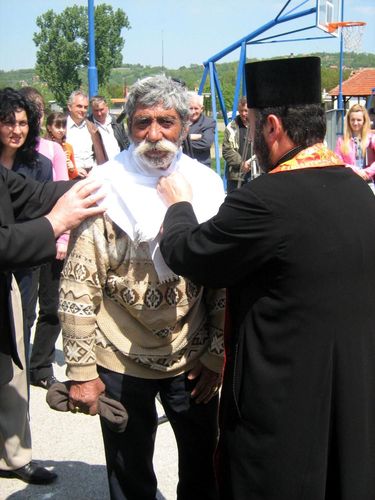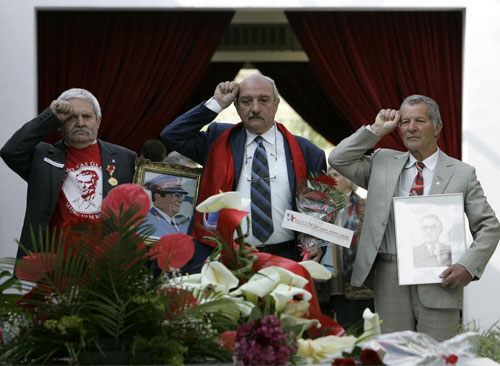Sunday, November 02, 2008
Tuesday, October 07, 2008
.JPG)
Giraffes for Europe
According to Blic, one of the conditions for SPS and its partners to join government was that the Jagodina Zoo would receive some giraffes--as to advance the touristic potential of "Strawberry" aka Svetozarevo, with the goal that one day, it will be know in honor of its current mayor as Palmarevo.
If giraffes work well as EU integration incentives, I can see potential in a major import business (impex)for the entire region.
Tuesday, July 15, 2008

From the "Fauna in Kosova" brochure of the Kosovo post...besides the fact that the pigeon and cow feature prominently among the fauna of Kosovo (I am all in favor of giving space to the less 'fancy' animals) there are some other gems here:
Duck: "Lives in Albanian lands, in Kosova and Albania." If we define Albanian lands by the habitat of ducks, count Canterbury in (and a few other places). Hhmm, by the way note that the stamp on the left pictures the famous swan-duck of Kosova.
Dog of Sharr: "a very old type of dog, extremely clean and faithful. Dog of Sharr is a native race of dogs in the Sharr region." Let's not forget the other side of the mountains in Macedonia, please.
The Cow: "Busha is a typical Kosovar cow and is one of the oldest races. This cow is very milkweed..." ok, enough of the my cow is an older race than yours game, but how can a cow be milkweed?
Saturday, July 12, 2008
I guess accepting the Socialist Party of Serbia to the Socialist International is no longer such a stretch of the imaginiation...
Thursday, June 26, 2008

In breaking news: "Kod Laktaša otvorena fabrika kroasana", finally a croissant factory in Laktsi!
I guess now we have some good "Pain de Laktasi" or maybe "Croaissant a la Dodik". But beware, let's not forget that legend has it that croissants were first made to celebrate the defeat of the Ottomans in Vienna in 1683.
Tuesday, June 24, 2008
Thursday, June 19, 2008
Friday, June 13, 2008
Now that Ireland voted against the Constitutional Treaty there is serious concern over the prospects for the EU's ability to integrate the Western Balkans. While in recent months the EU has been repeating that there are no obstacles to the EU integration for the countries in the region, there is a risk now that new conditions might be imposed on the countries that have little to do with countries' reforms and more with the reluctance of EU member states to push for enlargement.
After months of pampering the regions with promises of visa liberalization and the signing of the SAA with Serbia and Bosnia next week, except a lot more talk about absorption capacity and vague conditions, which will only further undermine the already rather weak position of the EU in the region.
Wednesday, May 07, 2008
Zagreb, 1. June 2011
With big fireworks in Zagreb and along the Hungarian and Slovene border, Croatia welcomed the opening of the border to the European Union and Croatia joining the Schengen zone. While free travel to the EU was never a problem for citizens of Croatia, the abolition of border posts to Hungary and Slovenia marks a great improvement for border communities, especially those which saw the hardening of the border when Slovenia joined the Schengen area back in 2008. The president of the European Union, Jean-Claude Juncker, congratulated Croatia on this historical step.
A little east from Croatia, however, political development in recent years suggest the European Union has failed to bring stability. Ever since the illegal referendum on independence of Republika Srpska in late 2010 Bosnia has de facto ceased to exist. The referendum followed the defeat of prime minister Dodik in 2010 by the candidate of the Serb Radical Party, supported by Belgrade and the closure of the OHR in 2009. The predominantly Bosniak and Croat Federation claims to represent all of Bosnia and rejects the declaration of independence of the Serb Republic, which has to date only be recognized by Serbia and Russia.
While reforms have accelerated in the Federation, the Bosniak member of the Bosnian presidency has recently accused the Croat party of being willing to sacrifice the claim on the Serb Republic for quick entry into the EU. Some Bosniak parties have in fact altogether challenged the EU membership, suggesting that the EU wants to break up Bosnia. This statement comes after the EU insisting that only a unified Bosnia can join the European Union. Considering the strong rejection of EU membership at this point by the Serb Radical Party, in power in Belgrade and Banja Luka, such a perspective appears unrealistic.
While the electoral success of the Radical Party in Serbia itself back in 2008 did not lead to a fully fledged roll-back of reforms in Serbia, the country has been increasingly polarized and the economy has stagnated. Besides the agreement that Lada would begin building cars in Serbia's Zastava car factor, few large foreign investments have materialized.
The proposal by the EU to establish a new partnership agreement with Serbia recently was welcomed by Serbian President Tomislav Nikolic, but rejected as long as the EU proposed agreement does not insist on either acknowledging Serbia's authority over Kosovo or the independence of the Serb Republic.
While Montenegro, Albania and Macedonia might join the EU by 2014, the prospects for Bosnia and Serbia, as well as Kosovo, appear bleak.
Monday, May 05, 2008
Friday, May 02, 2008
oops I meant 2008.
From B92: Grupa građana Za Čačak u okviru predizborne kampanje organizovala je krštenje Roma na prostoru gradske stočne pijace

Thursday, May 01, 2008
Vetevendosije! published in their recent newsletter this wonderful exercise in political correctness... maybe it's time for a regional international talk spell check (when typing FYROM, it automatically adds a footnote stating "
"UNMIK has sent a circular to its staff with the new terminology that they should use. The language to be used clearly indicates UNMIK’s position of hovering indecisively somewhere between Prishtina and
1) The Provisional Institutions of Self-Government (PISG) will now be called Kosova’s institutions or Kosova’s authorities but the use of the term ‘of the Republic of Kosova’ is prohibited.
2) Instead of the word ‘Serbia proper’, only the names of local towns will be used. If the term ‘Serbia’ is used, then a footnote must explain the views of both sides.
3) The term ‘Declaration of Independence’ must not be written with capital letters – because this would give it meaning.
4) The word ‘border’ (which is the standard term indicating an international state border) will still not be used to describe the northern border between Kosova and Serbia. Previously it was called an ‘Administrative boundary line.’ Now it will be called a ‘boundary line’ written in small case letters.
5) Even institutions previously called ‘UNMIK customs’ or UNMIK Railways will not be called Kosova customs, but just ‘customs’.
6) The ‘North’ of Kosova, will now be called ‘northern Kosovo’, and the ‘North’ of Mitrovica will now be called ‘northern Mitrovica’ - The first term is geographic. The second appears to have administrative and political connotations.
7) The process of ‘transition’ of the competences of UNMIK to the PISG and the ICO/EULEX will now be called ‘reconfiguration’ - This indicates merely a change in the structure and organization of the institutions and not the transition of powers from one institution to another. It means that UNMIK is never leaving.
Thursday, April 03, 2008
Saturday, March 22, 2008
Tuesday, March 18, 2008

The fall of a government...
The recent government crisis in Macedonia runs the risk of breaking with the tradition of Albanian party inclusion in goverment since 1990. The technical government in office since the government crisis triggered by the DPA leaving the governing coalition does not include Albanians, as the party refused to rejoin the government, even if only temporary. This reflects a general crisis in the Macedonian-Albanian political relations. Gruevski’s pledge to ignore ethnic politics when coming to office with the VMRO in 2006 has less meant tackling the other challenges Macedonia is facing, but rather ignoring the concerns of the Albanian community and engaging in constant campaigning, which has given him an edge over his main opponent, the SDSM, but alienated him from his coalition partner. New elections run the risk that his party might gain a strong position to form government, but will not facilitate compromise seeking with Albanian political parties. The failure of DPA to deliver during its time in government means that DUI will remain and probably strengthen its role as the strongest party among the Albanian community, resulting in a more difficult coalition forming process than after the last elections in 2006.
Thus, there are serious government and political crises in Bosnia, Serbia, Kosovo and now Macedonia.Saturday, March 15, 2008
Confronted with pressure from some EU states to handle banking secrecy more restrictively, Luxembourg's Prime Minister Jean-Claude Juncker, said "I look forward to many years of fascinating, fundamental, discussion." Now here's a way to make a threat. Velja, Kostunica and co., take note.
Friday, March 14, 2008
Tuesday, February 26, 2008
Democratic Republic of Macedonia (like Democratic Republic of Congo or German Democratic Republic, generally reserved for, ehm, less democratic state)
Constitutional Republic of Macedonia (as opposed to the unconstitutional of Macedonia?)
Independent Republic of Macedonia (here's a compromise for Kosovo, it just calls itself 'independent' with quotation marks and Serbia pretends to accept it, or maybe the official name of Kosovo could become "Lazna Republika Kosova")
Republic of Upper Macedonia (like Upper Volta, aka Burkina Faso)
I think generally republics should be required to add meaningful adjectives to their names:
"Smallish Republic of Montenegro" (SROCG)
"Kinda Democratic Republic of Serbia" (KDROS)
"Democratic Federal and Sometimes Confederal Republic of Three Equal Constituent People and Nobody Else of Bosnia and Herzegovina" (DFSCRTECPNEBH)
Monday, February 25, 2008
. Currently the Serbian government is trying to find the independence declaration of Kosovo so that it can be 'lost' to.


